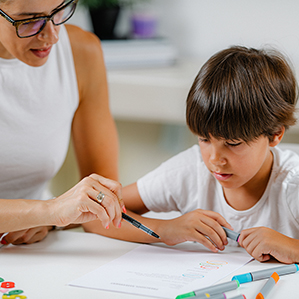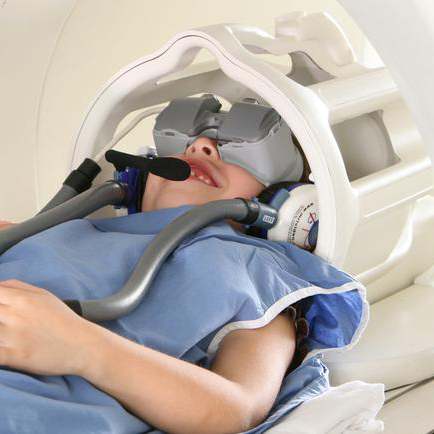“Cure” is the third pillar of our mission. Making Headway funds life-saving medical research through a variety of strategies. We fund many specific research projects, but we also support innovative laboratories and staff positions that enable dozens of other studies and clinical trials.
Children’s Brain Tumor Network
Making Headway was pleased to join the Executive Council of the Children’s Brain Tumor Network (CBTN). CBTN is dedicated to driving innovative discovery, pioneering new treatments, and accelerating open science to improve health for all children diagnosed with a brain tumor. “Innovation through collaboration” is made possible by CBTN’s biorepository and shared data portals, as well as the expertise of leaders in the field of biomedicine.
Read More/Less
This collaborative research effort has 26 primary member institutions; and has enrolled more than 4,361 subjects and collected more than 50,000 specimens. Through CBTN, researchers share expertise, specimens, and data to accelerate the finding of less toxic, more effective treatments and cures for children with brain tumors around the world. What sets CBTN apart from other biorepositories is the immediate and free availability of data for any researcher in the world, with the caveat that all information resulting from its use be shared back for everyone’s use. Just recently, CBTN received some extremely exciting news. The National Institutes of Health (NIH) has approved its request for support in sequencing a considerable portion of the remaining CBTN bank. The sequencing will provide researchers with unprecedented access to extraordinary data, which will provide fundamental insights into the causes of pediatric brain tumors, how they grow, and how patients can be effectively treated.
Brain Tumor Tissue Bank
Making Headway supports innovative, life-saving medical research around the world by means of the NYU Pediatric Brain and Nervous System Tumor Research Registry and Tissue Bank. This center catalogs and stores sample tissue from thousands of children with brain or spinal cord tumors, which can be accessed by researchers from anywhere in the world.
Read More/Less
The tissue bank maintains centralized records of biospecimen assets, and serves as a standard platform across all disease management groups for consent and study records, storage, data capture, and retrieval. This platform meets standards for GLP, GCP and non-GLP materials and documentation, enabling rapid, accurate patient and disease queries for all future research studies. This catalogued information ensures greater accuracy in biospecimen availability, and facilitates their timely distribution for research.
As researchers are positioned to greatly expand their molecular pathology capabilities over the next months and years and conduct comprehensive molecular studies, it becomes paramount to collect and maintain this invaluable information in a clinical database. Making Headway funds the role of Data Manager at the center and covers the cost of sharing samples. The program promotes research and collaboration and has already led to promising discoveries in the field of childhood brain and spinal cord tumors.
Clinical Trial Research Manager
Clinical trials are an essential aspect of research, ensuring that a given medical strategy, treatment, or device is safe and effective for humans. Making Headway funds a Research Manager who has the specific role of organizing and managing these clinical trials at the Hassenfeld Children’s Center. Every trial has the potential to uncover a new treatment or even a cure.
Read More/Less
New treatments and therapies are required to go through an increasingly complex clinical trials process, often over the course of many years, before they are approved. The Clinical Research Manager, funded by Making Headway, is responsible for the day-to-day operations of the Clinical Trials Office, implementing and overseeing clinical research programs, regulatory and data management, coordination of ongoing analysis, and managing large-scale clinical trials.
Since this grant began, the Clinical Research Manager has overseen 35 active research projects that were devoted solely to pediatric brain or spinal cord tumors.
Making Headway Foundation understands that in order for children to receive the highest quality medical services, doctors must be specially trained to understand the unique issues of pediatric brain and spinal cord tumor patients. Making Headway is helping to meet this need through the funding of our annual Pediatric Neuro-oncology Fellowship Program.
Read More/Less
Chosen from among the best doctors in the country, fellows evaluate and treat children with a broad range of brain or spinal cord tumors. They manage neurological complications of systemic cancer in children, assist in conducting clinical trials, and prepare for an academic leadership career in pediatric neuro-oncology. Now in its sixth year, the Making Headway Fellowship Program has been a great success; each fellow has moved forward with a robust career in pediatric neuro-oncology.
| Fellow | Fellowship Year | Current location | Current responsibilities |
|---|---|---|---|
| Genevieve Legault, MD | 2011-13 | Montreal Children’s Hospital, Montreal, PQ | Pediatric Neurologist |
| Diana Osorio, MD, MPH | 2013-14 | Nationwide Children’s Hospital, Columbus, OH | Pediatric Neuro-Oncologist |
| Harini Rao, MD | 2014-15 | NJ College of Medicine, Newark, NJ | Pediatric-Hematology/Oncology |
| Devorah Segal, MD, Ph.D | 2015-16 | NYU Hassenfeld Children's Center for Cancer & Blood Disorders | Pediatric Neurology, Pediatric Neuro-Oncology |
| Rohini Singh, MD | 2016-17 | Hackensack University Medical Center | Pediatric Hematology-Oncology |
| Fernando Suarez, MD | 2017-18 | NYU Langone Medical Center. | Clinical Instructor, Department of Pediatrics |
| Sheetal Phadnis, MD | 2019-20 | Children’s of Alabama, Birmingham, AL. | Faculty in Pediatric Neuro-oncology |
| Robyn Borsuk, MD | 2020-2021 | NYU Hassenfeld Children's Center for Cancer & Blood Disorders | Current Fellow |
Gift from a Child is a program of the Swifty Foundation to help children who are diagnosed with brain cancer. When a child’s life ends too soon, donating tissue is a way for the child and family to take a final stand against cancer. Tissue donation is a contribution that improves outcomes for children with brain cancer that only families can make.
Read More/Less
It is not easy to obtain tissue samples when the disease is in a child’s brain. Tissue samples can be obtained during a craniotomy, a complex surgery to remove the tumor from the brain; samples can be obtained through a biopsy which also can be complicated and pose risks for the child; and samples can be obtained at the time of death through an autopsy. When a child’s life ends too soon, donating tissue is a way for a family to take a final stand against cancer. Many families have reported their decision to donate their child’s autopsy tissue was one of the few positive steps they could take during those final tragic days. Tissue donation is a contribution to improving outcomes for children with brain cancer that only families can make.
Clinical Trials Research Nurse
With the tremendous activity of the Hassenfeld Children’s Center’s Clinical Trials Office, managing the patient-facing components of clinical trials is a growing challenge. Research nurses can be intimately involved in all aspects of clinical trials, from development and recruitment, to patient education and reporting. Funding through Making Headway, the newly created position of Clinical Trials Research Nurse will serve as the central point of contact for patients and families throughout their time enrolled in a trial, from their initial introduction to the study until they finish the trial. In this way, the research nurse position is an ideal complement to the clinical trial manager role.
Read More/Less
Research nurse responsibilities include:
- Developing new research protocols in partnership with physicians and researchers
- Recruiting patients for clinical trials and verifying eligibility.
- Educating families and patients about their options and study details. This includes providing information on timelines, procedures, drugs being used, anticipated side effects, and documenting symptoms.
- Guiding patients through the study consent process.
- Following patients recruited to a clinical trial or study through their treatment, making sure they attend all necessary visits as per protocol and that all necessary data is collected at each visit.
- Assessing patients’ health and reviewing adverse events or treatment toxicities.
Neuropsychology Testing Program
Research is well-established that children with oncological and neuro-oncological diseases frequently face a host of neurocognitive, academic, and socio-emotional challenges both during and after treatment. The Hassenfeld Neuropsychology Testing Program, funded by Making Headway, was created to evaluate and monitor children newly diagnosed with pediatric brain tumors.
Read More/Less
The newly developed protocol uses a battery of tests, based upon a comprehensive review of the most recent research in the field, to understand, identify, and document the effects of both disease and treatment. Each newly diagnosed, eligible patient at Hassenfeld Children’s Center is offered the opportunity to enroll in the program; evaluation results not only support research but also identify areas of concerns for the child and suggest appropriate interventions, such as educational supports and related services.
CinemaVision
Making Headway helped fund two new CinemaVision A/V Systems for pediatric MRI patients at NYU Langone Medical Center. Now children can relax in a virtual comfort zone and enjoy favorite movies and musical entertainment during their MRI exams. Studies have shown that MRI entertainment can help soothe anxious patients, especially children, and minimize fear and anxiety.
For information on other Making Headway Programs, click on the link
Care – Individual Counseling Program
Care – Educational Assistance Program
Comfort – In Hospital Services (yoga, massage, etc.) / Playroom
Comfort – Scholarship Program
Comfort – Family Events
Cure – New Medical Research Grants
Cure – Facilitating Medical Research and Clinical Trials
Cure – Neuro-oncology Fellowship Program








 Instagram
Instagram